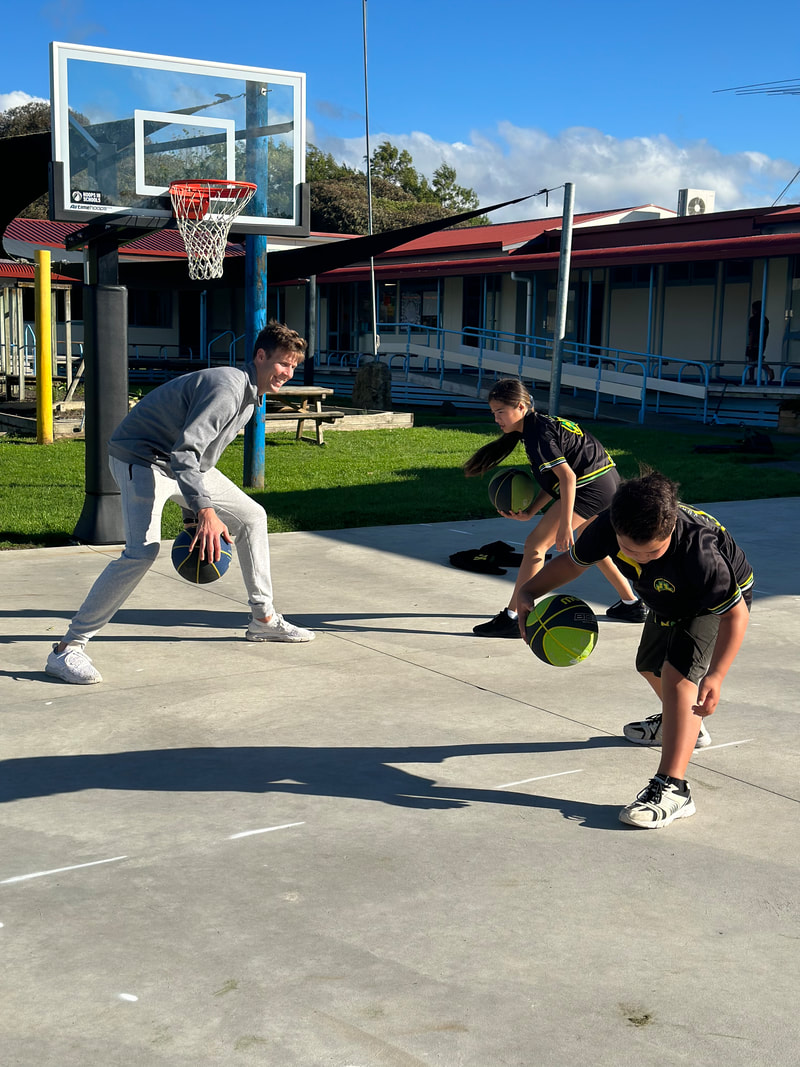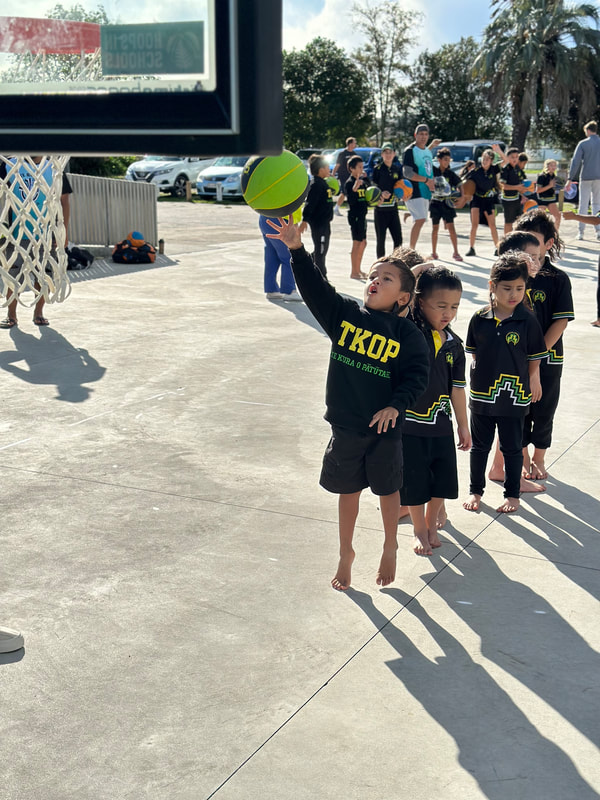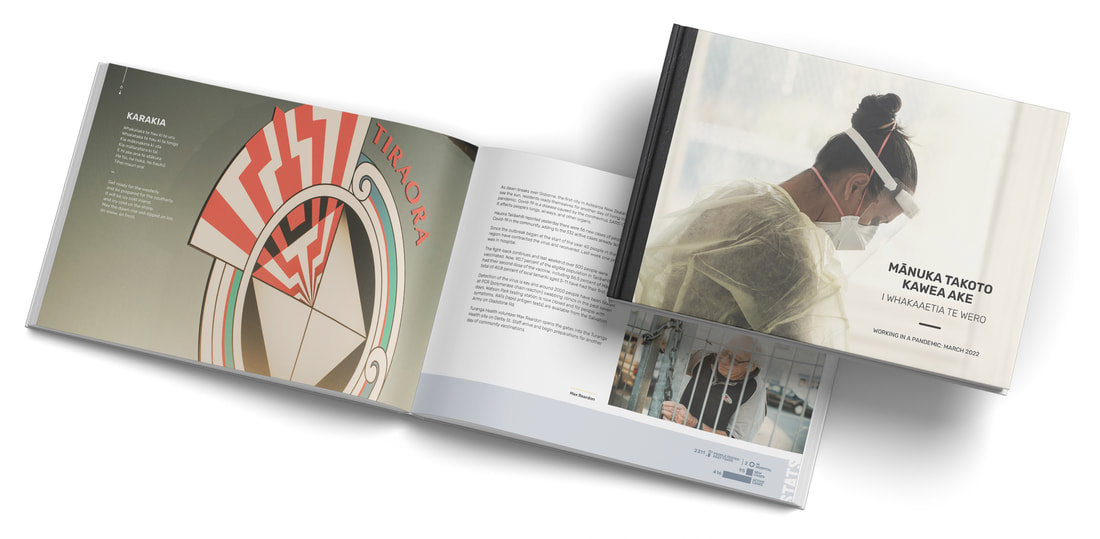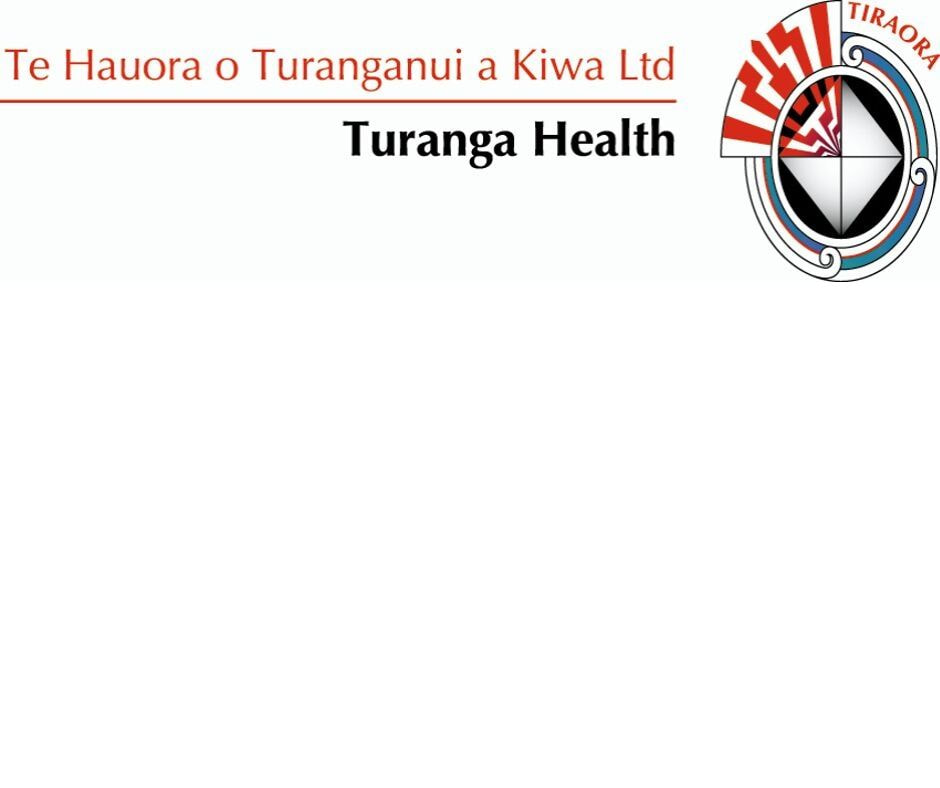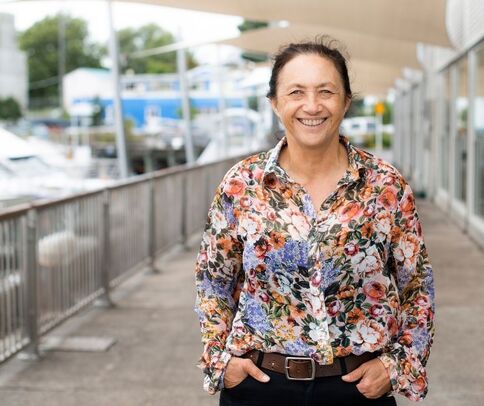 Turanga Health’s senior researcher Dr Shirley Keown breathed a sigh of relief then rang her boss when this year’s budget scrapped the $5 prescription charge for medicines. She knew the fee was damaging the health of vulnerable populations because she was a researcher in the Otago University FreeMeds study that proved it. “It’s just amazing to know that you have contributed to something that is going to have positive outcomes for whānau.” The study Dr Keown contributed to was published in the journal BMC Health Sciences Research and involved whānau from Tairāwhiti and other regions. It proves prescription fees are a major barrier to accessing health services and this leads to patients in vulnerable populations facing worse health outcomes. [See below]] Currently, people pay $5 for each new prescription item. “You pay a small contribution to the cost of the medicines prescribed by your doctor — which is $5 for most items. If your medicine is not fully subsidised, you might have to pay more.” Dr Keown says the current system was not supporting Māori to live long and healthy lives. “Māori didn’t seem to have full access to medicine and health care they are entitled to, and that really annoyed me. I needed to red flag this somewhere, and my earlier research and now this, is how I’ve done it.” Dr Keown, Rongowhakaata, is a senior researcher, clinical mentor, and quality manager at Māori health provider Turanga Health. Before taking part in the prescription copayment research, she earned her doctorate through the Otago University School of Pharmacy with a body of research looking at how Māori with type 2 diabetes access and use medicines they’re prescribed for the disease. Dr Keown has always hoped the research she’s involved in will lead to practical solutions for improving Māori health. “It was a hard slog to get this one over the line but once it materialized and was tangible, we knew we were on to something.” The researchers lobbied hard for the Ministry of Health and Pharmac to read the study. “The communities know that copayments are a barrier, but we needed to make sure others knew. We had to build the case. We didn’t want it sitting getting dusty on a shelf somewhere.” On the day of this year’s budget announcements, Finance Minister Grant Robertson referenced the study. He said, “the Otago University study that we based a lot of our decision-making on indicates that there is a significant cost where people don’t pick up their prescriptions and end up back in the health system.” Dr Keown says when she heard the news she immediately contacted Turanga Health chief executive Reweti Ropiha. “Boom! That’s what he said. Boom, and I couldn’t agree more.” Cost preventing patients from accessing medicines Between February 2020 and January 2021, researchers from University of Otago, Turanga Health and Victoria University looked at whether exempting people with high health needs and living in areas of high deprivation from a $5 charge reduces hospital use. The 1061 participants recruited were randomly split into two groups, an intervention group, that had their prescription copayments paid by the research team during the trial, and a control group that did not. Results of the study, published in the journal BMC Health Services Research, revealed the intervention group members were much less likely to be hospitalised during the trial. For every 100 people who received free prescriptions, 33 were admitted to hospital and stayed for 208 days. For every 100 people who still had to pay the $5 charge, 41 were admitted to hospital and stayed for 326 days. There were also statistically significant reductions for the intervention group in the number of hospital admissions for mental health problems and chronic obstructive pulmonary disease (or COPD) plus reductions in length of stay for COPD. Researchers involved in the study were Pauline Norris, Kim Cousins, Simon Horsburgh, Shirley Keown, Marianna Churchward, Ariyapala Samaranayaka, Alesha Smith and Carlo Marra. Dr Shirley KeownDr Shirley Keown has for a long time been recognised as one of Tairawhiti’s most senior nurses and health programme managers.
After working in hospitals in Wellington, Auckland and Gisborne, she came to Turanga Health in 1999 and created its Well Child Tamariki Ora programme which now looks after nearly half of the 700 babies born in Gisborne every year. In 2007 she led the organisation to achieve its first accreditation. Already armed with a Bachelor of Nursing, Dr Keown added a Master’s in health science to her qualifications in 2007, and has earned all the university-level pharmacology papers she needs should she decide to become a nurse prescriber. In 2020 she graduated with her doctoral research degree. Dr Keown is now supporting Turanga Health with three prominent nationwide studies. The first is looking at the ongoing impacts of Covid-19 and future pandemic responses. The second study, funded by Health Research Council of New Zealand, is looking at how iwi health providers can measure the impact and social value of their activities. The third study has been following whānau over a year to understand their experiences of accessing healthcare and medicines.
2 Comments
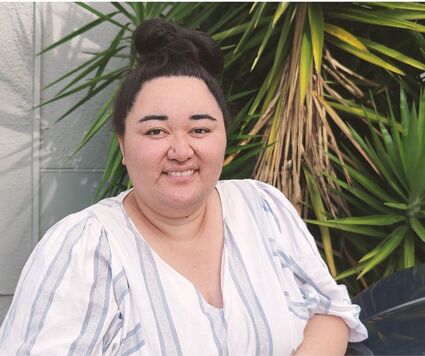 Turanga Health nurse Riaana Higgins is passionate about hapori whānau nursing and is studying to become a prescribing nurse in the community. After a year working in Oranga Hinengaro Māori Mental Health in Manawatu, the 28-year-old has returned home to te Tairāwhiti and has been at Turanga Health for nearly a year. “I always wanted to work in the community,” says Riaana, Ngati Porou, Ngai te Rangi. “I missed my family, and I decided early on that if there was an opportunity to come home then I would try and work for Turanga Health.” Riaana was a community nurse with Oranga Hinengaro in Palmerston North. She was part of a team providing assessment, treatment, and care to tangata whaiora of all ages and their whānau. It was a for Māori, by Māori service. “I like being out and about in the community because you see a different perspective of someone. When they come to the clinic you just see them for a short time in one place but when you go into their home you can see their social situation as well.” Now working with Turanga Health’s community nursing team, Riaana is studying part-time to become a prescribing nurse in the community. The postgraduate diploma was created so nurses with prescribing qualifications could safely improve access to healthcare for people with long-term or common health conditions. Riaana is doing the study through EIT and looks forward to qualifying in 2025. Riaana lives with her beloved grandmother Mate Wanoa. “Nan is in Turanga Health’s Kaumātua Programme and always said nice things about Turanga Health.” It was just one more reason for Riaana to return home and do the mahi she loves. 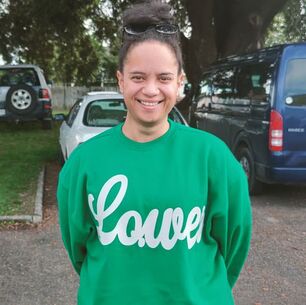 Awhina Kaihe, Ngāti Porou, Ruatoria, is living her best life as a kaiāwhina with Turanga Health. The former teacher aide and mother of one joined the iwi health organisation in September 2022 and says working in primary health services for whānau has changed her worldview. “It’s a job that’s opened my eyes to what is going on for some people and that there is no room for judgement.” Awhina is part of the tamariki ora team helping to look after around 350 pēpi born in Gisborne every year. Nurses and kaiāwhina provide the nationally-available Well Child Tamariki Ora programme of health visits for children from 6 weeks up to 5 years. They also provide ante-natal wananga and other support for māmā and their pēpi. As a single māmā, Awhina is more aware than most about what it’s like to feel vulnerable and in need of support from others. In 2021, while heavily pregnant with her daughter, she fell gravely ill with pneumonia and bronchitis. Struggling to breathe she was rushed to hospital in Gisborne and admitted to the intensive care unit (ICU). She was then transferred Tauranga Hospital’s ICU. “It was life-threatening for me and I could have lost her,” says Awhina in her husky voice, another reminder of what impact the illnesses had on her. “Yes, a lot of people notice that! The illness took my voice from me and two years later it’s still coming back slowly.” Another big change for Awhina has been an incredible weight loss over the past three years. Once weighing in at over 140kg Awhina is now a healthy body shape and size giving her the freedom to do the things she and her daughter love like spending time at a whānau farm near Ruatoria. “It’s so peaceful up there.” Awhina, whose name means helper, grew up on the East Coast and went to school at Te Kura Kaupapa Māori o Te Waiu O Ngati Porou, and Lytton High School. She worked towards getting her teacher’s certificate from Te Whare Wānanga o Awanuiārangi and says she will complete it one day. Awhina worked at Te Puna Reo o Raparapaririki in Ruatoria for three years before making the move to Gisborne and working at a kōhanga reo as a kaiāwhina, also for three years. On the day of this interview Awhina, 28, was observing nurse and kaiāwhina influenza and Covid-19 immunisations at a Turanga Health vaccination clinic. The experience is setting her up to work at Turanga Health’s popular and successful whānau vaccination drive-through events held most weekends around the rohe. “Joining Turanga Health has been a healthy decision for me, and my baby and I am grateful every day I have the opportunity to work here. I now see the difference we can make with the help that we can provide. I see it on their faces. I’ve told my mum and dad; ‘this is the workplace for me’.” 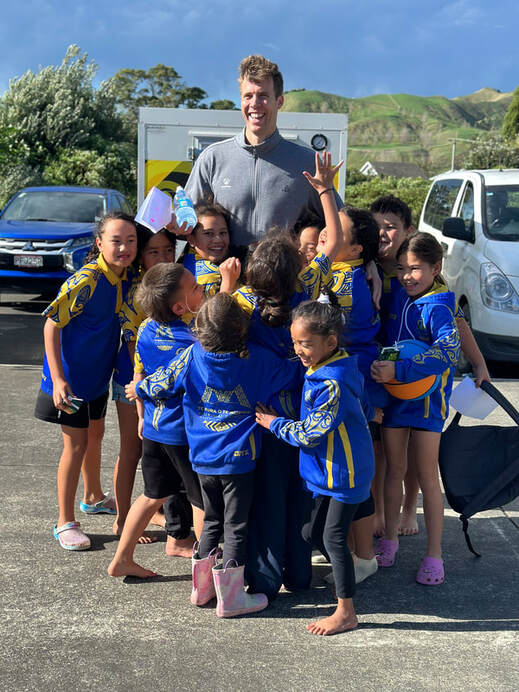 New Zealand Breakers basketball player Tom Abercrombie is swarmed by fans from Muriwai School at the Hoops in Schools launch last week. New Zealand Breakers basketball player Tom Abercrombie is swarmed by fans from Muriwai School at the Hoops in Schools launch last week. Turanga Health hosted Hoops in Schools launches at four primary schools last week with help from New Zealand Breakers basketball player Tom Abercrombie. Hoops in Schools is a Basketball New Zealand programme that partners with schools, funders, local basketball associations and other basketball providers. The concept puts more fit-for-purpose hoops in schools, so young people are more active and having fun playing hoops in their communities. Abercrombie and the Turanga Health team visited Muriwai, Manutuke, Patutahi and Whatatutu Schools to the delight of students. Meeting a sports star and slam dunk competitions were just some of the fun enjoyed by the students. “It was a huge moment for them to meet a real-life New Zealand sports star and Olympic athlete,” says Turanga Health population kaiwhakahaere Dallas Poi. “A lack of suitable equipment and facilities is one of the biggest barriers to school sport participation so when the children see the new equipment, they are excited and want to start playing straight away.” “We know the significant impact that it has had across other schools where hoops have been installed previously – increased participation, more students physically active and schools engaged with local associations. It’s a win for everyone.” 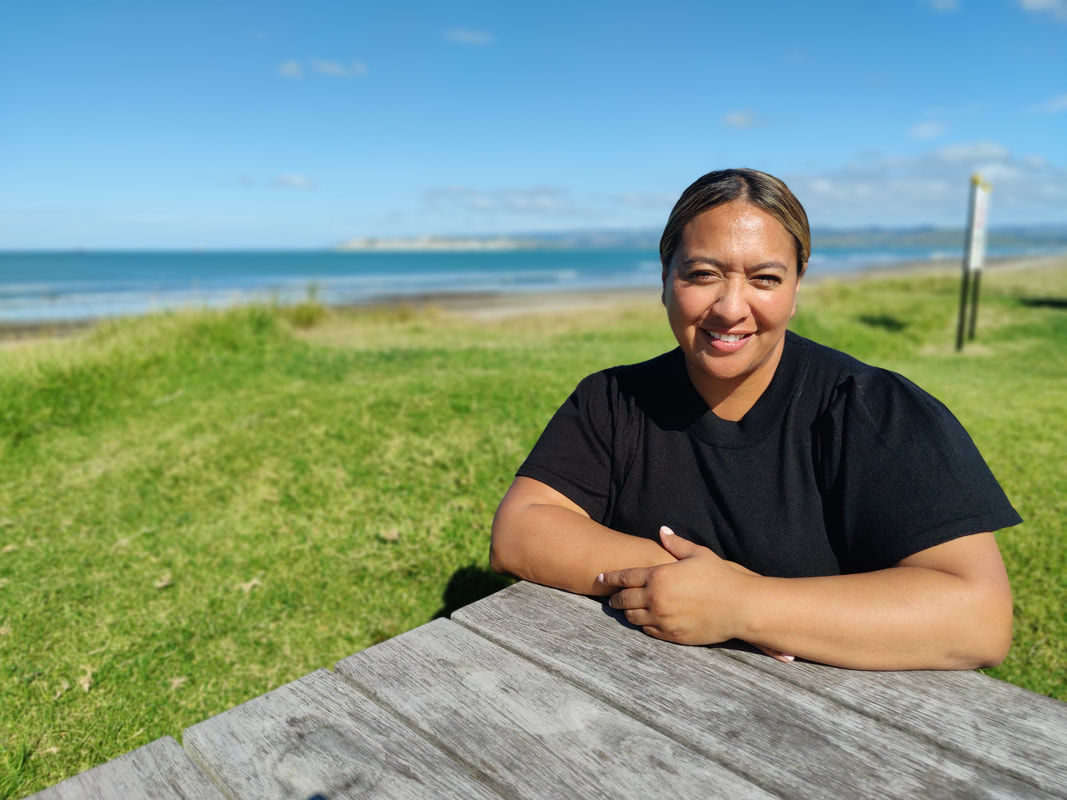 Ko Mātiti te maunga Ko Maraetaha te awa Ko Ngāi Tāmanuhiri te iwi Ko Horouta te waka Ko Muriwai ahau Former Ministry of Social Development employee Alisha Kemp brings experience helping people in need to her new role with the māmā and pēpi team at Turanga Health. Alisha says working in a role where you assist whānau facing complex and challenging circumstances helped her understand the importance of listening to the whānau voice. “It helps break down barriers and meet whānau needs - similar to what we do here at Turanga Health.” At Turanga Health, Alisha, Ngāi Tāmanuhiri, works with E Tipu e Rea, a holistic program that helps look after māmā who are facing challenges while they are pregnant, or when they have a new-born or young child. E Tipu e Rea referrals from around the rohe are managed through the Turanga Health team. Once approved, staff from Turanga Health, Ngāti Porou Hauora, and Te Whare Hauora o Te Aitanga a Hauiti work with these families. Alisha says it's rewarding to be working with whānau for whānau at an innovative, forward- thinking, mobile organisation. Last weekend, nurses and kaiāwhina hosted a Turanga Health Whānau Day for vaccinations on the grounds of a school. “Turanga Health is so far ahead in culture and what they do for whānau. They go to the people and never see any barriers.” Alisha worked in Government services for 15 years, most recently with Work and Income NZ. Before that, she was with Study Link helping students with their finances. After she saw the Turanga Health administration vacancy advertised Alisha had to ask her māmā Louise Kemp for her blessing to apply. Louise has worked for the iwi health provider for over 20 years. “I have seen my mum start each day so passionate about her mahi and now I can see why.” Outside of work, Alisha is a proud māmā to daughter Jayda Riarn and son Eli-Brooks. She enjoys spending time with whānau and friends, keeping fit, and giving things a go including the social and sporting opportunities Turanga Health creates for its staff. 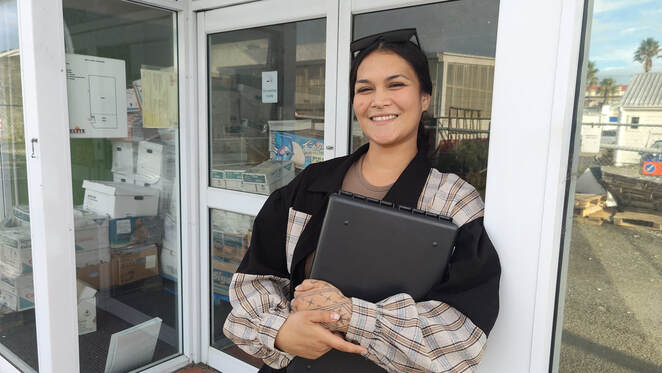 LOUISA-MAY Robinson went from client to staff member after existing Turanga Health staff encouraged her to apply for a recently advertised kaiāwhina role. Louisa-May, Ngati Porou, was receiving support from the Turanga Health emergency housing team when kaiāwhina Naleya Ahu identified her quiet abilities. “She had a lot of potential for a young person, took on a lot of ownership and responsibility for her whānau and the way forward.” Naleya was particularly drawn to Louisa-May’s aptitude for problem solving and communicating. “She’s approachable, honest with people, and always upbeat with a smile.” Louisa-May was taken aback by the suggestion. Too much self-doubt she reckons. “But I did it anyway, and I love it so much now.” Previously, Louisa-May, 25, has been raising her nearly-three-year-old daughter alongside taking on some work in kōhanga reo. Now she has thrown herself into kaiāwhina on-the-job training and qualifications by shadowing nurses and kaiāwhina, and working alongside hapū wahine. This month she’s studying to become a vaccinator so she can administer influenza, Covid and booster vaccinations, as well as some childhood and hapū māmā immunisations. There’s theory and practical modules to advance through. On the day she was interviewed Louisa-May had vaccinated a fellow staff member with this year’s influenza vaccination. “I love that Turanga Health upskills all its kaimahi. You never get bored here.” Louisa-May began with Turanga Health just days before Cyclone Gabrielle hit the district. She joined forces with other Turanga Health kaimahi cooking meals for whānau flooded out of their homes and emergency response staff working on the frontline. “I enjoyed it, it was cool to know we were doing something that was helping.” Louisa-May feels like she’s “home” now she’s working at Turanga Health. The organisation prioritises kaimahi physical and mental health, ensuring staff can manage family life around their work commitments, and access fitness and team building opportunities. It’s a good fit for Louisa-May, who values personal health to best support the growth and development of her own moko. And it’s another attribute Naleya noticed when they first met. “You have to start with selfcare in order to be able to help others, and Lou is all about that.” Louisa-May is grateful for the opportunities on offer and hungry to learn more. “I’m so glad I came out of my comfort zone and applied for this job.” 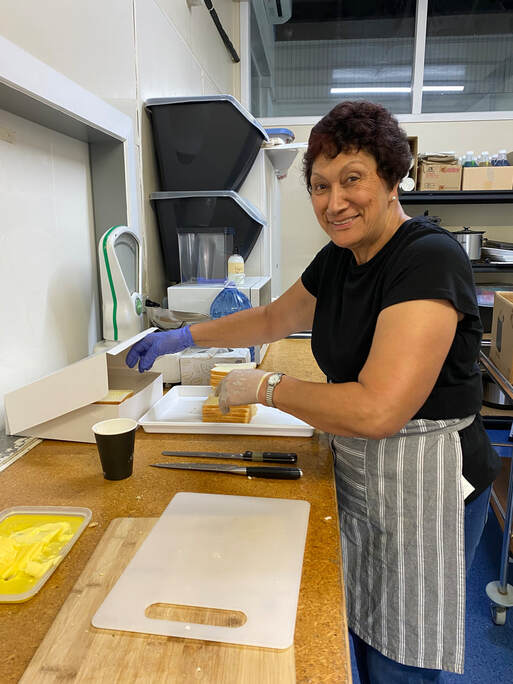 Turanga Health chief executive Reweti Ropiha steps away from a morning hui. Sunshine streams in through Turanga Health’s Derby St front office windows as he reflects on the iwi health organisation’s response to Cyclone Gabrielle. “This place, this region, is still the number one paradise,” he says. It’s Wednesday 1 March and today things do seem blissful. But it wasn’t like that three weeks ago when Reweti and Turanga Health were preparing for Cyclone Gabrielle. “We were tracking the cyclone on that Sunday and we could see the intensity. It was going to be big.” Staff refilled Turanga Health’s vehicles and fuel containers and checked their portable generators and chillers. Logistics staff contacted the company’s suppliers to shore up medication, fuel, and practical items that might be needed in coming days. And the finance team paid staff a day early – just in case systems went out. On Monday 13 February the cyclone arrived in full force and left the district reeling. Houses were damaged and areas were left covered in silt. Power went out and communications crashed. A local state of emergency was declared at 9.45am. This was superseded by a national state of emergency at 8.45am on Tuesday 14 February and extended on Monday 27 February for an additional seven days. “There must have been a thousand emergency plans written in this country but I’ve never seen one where we had to deal with all the issues we faced,” says Reweti. On Tuesday, Turanga Health staff that could get to work, congregated in the Derby St office. Reweti says the iwi health organisation had a “keep it connected and keep it real” approach. Whānau with disabilities, hapū māmā, and whānau living with a mental health illness or chronic disease were prioritised. “We had a list of those people and where they lived.” Armed with kai prepared by staff in the catering kitchen next door, kaiāwhina and nurses began visiting each person. It was “good old fashioned door knocking,” and between Tuesday and Friday staff checked in on over 1000 individuals. If road access allowed, staff visited families in rural communities including Manutuke, Muriwai, and parts of Patutahi. It wasn’t until Wednesday the full scale of what had happened to Te Karaka whānau trickled through. That was a shock, says Reweti. Turanga Health runs the general practice in the small settlement town. “It was important to us to open it up.” By Wedneday afternoon practice staff were seeing anyone who needed medical help or their prescription filled. It was also a place to gather. “Our priority was to make it a place of solace. Whether it be to see a doctor, have a coffee, or a shower, we were open to walk-ins.” Meanwhile, whānau flooded out of their homes had been evacuated to Te Karaka Area School, and Turanga Health contributed to the support efforts there with food, hygiene packs, vehicles, chillers, and staff. Back in town, Turanga Health’s Elgin hub on the corner of Childers Rd and Titoki St also became a place of solace and doubled as a temporary medical centre. Medical staff were flown in and provided 204 Pasifika recognised seasonal employees with a wellness check. Turanga Health’s agility when responding to the crisis developed out of its Covid-19 community response. Since 2020 its created hundreds of small and large-scale drive-through clinics so people can be vaccinated, tested, or pick up testing kits. In this way, Turanga Health staff have supported tens of thousands of people. Now, in the aftermath of Cyclone Gabrielle, the team turned its process upside down reverting to face-to-face communication, services, and support. For the 10 days after the cyclone staff gathered each morning for a briefing. In late afternoon they met again to share intelligence, progress, and evaluations. With power and communications sometimes out three office whiteboards were the one source of truth. Turanga Health was involved in other areas. It worked with Te Whatu Ora Tairāwhiti to source Starlink kits. It facilitated a temporary mobile eftpos service for whānau in Te Karaka, Mangatu, Muriwai, Patutahi, Waihirere, and Elgin. Turanga Health staff also helped source gumboots, worksocks, underwear and hygiene products. “Whānau needed practical stuff.” Now, in early March, while still supporting flood-affected whānau, Turanga Health is ramping up business as usual. Staff will begin influenza and measles vaccination clinics as well as the next round of Covid-19 boosters. Kaimahi energy levels are high. Turanga Health staff learned during Covid-19 to pace themselves. “On Tuesday, right after the floods, I told staff ‘we need to manage ourselves for a long game. We’re no good to anyone if we fall over’.” Reweti, who this year was recognised in the 2023 New Year’s Honours list, is proud of the staff. “Schools were closed and their children were at home. Given the devastation and everything in front of them they consistently turned up. Because of their deep understanding of their communities and the people they serve, our kaimahi are an invaluable resource during times of crisis. I couldn’t ask more of them.” As Reweti steps outside the office into the sun he says the community’s reslience also inspires him. “People may be struggling to comprehend what has happened but they were all there for each other.” 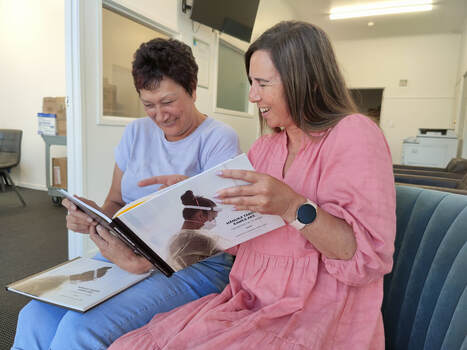 Photographs taken during the region’s Covid-19 pandemic illustrate an exclusive book documenting Turanga Health staff mahi during March 2022. Mānuka Takoto Kawea Ake, I Whakaaetia Te Wero, Working in a Pandemic: March 2022 is a limited edition coffee-table book capturing the gritty reality of working alongside the public as the Covid-19 Omicron strain ripped through Tairāwhiti. Turanga Health chief executive Reweti Ropiha says the powerful images taken by locally acclaimed photographer Brennan Thomas will evoke memories and inspire conversations for years to come. “It’s been a tumultuous two years and March 2022 stands out for many.” During the month-long assignment Turanga Health staff were photographed working at Covid-19 vaccination events and testing stations, in the general practice at Te Karaka, and while providing care in the community. Staff who were ill with Covid-19 or isolating with whānau were photographed outside their homes from a safe distance. “It’s an incredible as-it-happened account of an interesting time in our history.” March 2022 was a busy time at Turanga Health. Daily cases of Covid-19 in Tairāwhiti and New Zealand hit record numbers. The purpose of testing shifted away from trying to find every case, to instead providing intelligence on the size and spread of the regional outbreak. For Turanga Health staff it meant managing the dual demands of prevention and management. “That month our staff learned to pivot as and when needed and Mānuka Takoto Kawea Ake has captured all of that with candour.” Turanga Health board chair Pene Brown says every staff member employed by Turanga Health in March 2022 was featured. “The book acknowledges that everyone had a part to play, and that everybody was part of a successful response.” Alongside each staff photo is a written account capturing the small intimate details of a person’s work and their emotions on the day. He says the book is a keepsake for staff and has now become a companion piece of literature sitting alongside news stories and scholarly articles documenting the time. Mr Brown says “this style of storytelling will age well.” Photographer Brennan Thomas says there were challenges wearing, and photographing people in, personal protective equipment (ppe) and face masks. “Working in my own ppe made for sauna-like conditions but it was nothing compared to what the staff were experiencing. You could see it was tough and physically draining.” He adds that the assignment was unusual because no one really knew what would happen next. “It’s rare for a photographer to have access to a group of people who, despite the seriousness of the situation, are happy to have their lives unfold on camera and tell their story as and when it happens.” Two hundred out of 3000 photos were selected for the 80-page book written by journalist Hayley Redpath and designed by Rose Hutchings from Draggnett Design. Copies were gifted to Turanga Health staff at Christmas. Books have been distributed to national and local decision-makers, and copies have also gone into libraries, iwi collections, and health and education organisations. “The book is an invaluable record of staff and their mahi and is sure to spark reflections on humankind and Covid-19 for generations to come,” says Mr Ropiha. 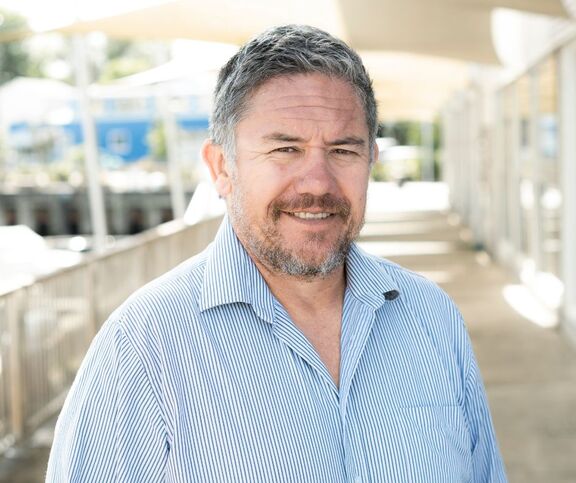 REWETI Ropiha has been recognised in the 2023 New Year’s Honours list becoming a Member of the New Zealand Order of Merit (MNZM) for services to Māori health. The 54-year-old was in his office at Turanga Health in Gisborne when he first learned the news in November 2022. “At the time I thought the staff member was winding me up,” says Mr Ropiha, who kept the honour a secret until New Year’s Eve. Mr Ropiha, Rongowhakaata, Ngāi Tāmanuhiri, says he’s overwhelmed to have received recognition and feels humbled and blessed to be able to share it with whānau and colleagues. “It is a great honour especially as there are so many faces and people who have gone before helping to shape what we do for the community.” Mr Ropiha has been recognised for his dedication to improving the health and wellbeing of Māori living in the region, particularly in his role as chief executive of Turanga Health. The honour comes on the back of a Gisborne District Council Civic Award and a Kiwibanki Local Hero medal for Mr Ropiha. Mr Ropiha is a champion for his people and their health. He has been at the helm of the iwi health organisation for 25 years. He and his team worked hard during the Covid-19 pandemic to help the region get vaccinated. With a kaupapa Māori approach that included hosting mass vaccination events around the rohe and face-to-face kōrero, Turanga Health staff were driven to provide opportunities for people to engage with the science about vaccines in ways that suited them. Looking back Today’s public demand for Turanga Health’s services and its highly regarded position in the region is in sharp contrast to its humble beginnings. When a 28-year-old Reweti Ropiha bounded into Tūranga Health in 1997 he took over a shy fledging company with an opening cash balance of $300 and fewer than 10 clients. Recently returned from four years of overseas travel and feeling enlightened, Mr Ropiha was ready to apply himself to new challenges. “I had a sense that there was an opportunity there, not just for myself, but for the rohe.” Reweti grew up in Manutuke, a whāngai son of Wikitoria and Ratu Ropiha. He went to Manutuke School, Lytton High School, and has completed a double degree in politics and business and a Master of Business Administration through Waikato University. He credits his parents with teaching him about the importance of living by Rongowhakaata and Ngāi Tāmanuhiri values and connections with whānau. “It was a simple upbringing; you were there for others and we shared everything. We helped people we didn’t necessarily know, and we followed our elders’ approach to common sense. I craved that when I was overseas, and I wanted to help participate in, and restore that, when I came back to Gisborne and started at Tūranga Health.” The evolution of Turanga Health Tūranga Health was created at a time of colossal change in the health sector - when community level organisations were playing a greater role in primary health care delivery. Across the country Māori health providers were flourishing. In Gisborne, Te Runanga o Tūranganui-a-Kiwa created Tūranga Health as its health arm. It was a new kid on the block and very much in the shadow of neighbouring Māori health provider Ngati Porou Hauora. “Everything was evolving, and we moved tentatively,” remembers Mr Ropiha. “The space was shifting from centralised power bases, to one of using other approaches in the delivery of health services.” “Tūranga Health saw this as an opportunity not to replicate what was existing, but to embrace an approach of wellbeing that would include “kanohi ki te kanohi”, taking services to the whānau in whatever setting, and introducing a wider holistic lens.” In 1998 Reweti and his small team took the cash-strapped Vanessa Lowndes Centre, where Reweti had once worked, under its wing. By now Tūranga Health had 150 people on its books. Then it launched the extraordinarily successful Kaumātua Programme. “Our approach for health service delivery for older people was about keeping whānau in their home for as long as possible. We knew we were part of the jigsaw, and saw the need for a place for pākeke to congregate and thrive.” Over the next four years Reweti oversaw Tūranga Health develop its unique approach and style of operating. In 2002 Tūranga Health took the first in a series of steps that would see it become the large-scale proficient business it is today. It teamed up with two general practice associations (Pinnacle and First Health) to form Tūranganui Primary Health Organisation. This model was unique in that the owners were independent practitioner associations and an iwi health provider. Turanga Health today Now, Tūranga Health boasts a general practice in Te Karaka with 1600 registered patients, over 20 onsite workplace wellness programmes, one GP, one nurse practitioner, one consulting primary care expert, 12 nurses, and an ever-growing group of vaccinator-trained kaiāwhina. It has 3,000 registered whānau on its books and community-wide acceptance after helping the region’s residents through the pandemic. The company holds multiple Government and local contracts. It has moved into the mobile vaccination space and will soon increase its physical footprint into Elgin. For the past 10 years it has worked alongside the Otago University in numerous research projects. “That’s been half of the attraction of this company, it doesn’t stand still. We’re always looking for new opportunities. I can tell you this is not a space of boredom. There have been countless efforts and contributions - not just my own. We can all stand proud of Tūranga Health.” When asked about the future of Tūranga Health, the father of three boys, says the windscreen is bigger than the rear vision mirror. “More than ever Tūranga Health continues to unlock responsive approaches to whānau demand, whereby staff can continue to provide real time care in the communities and homes of whānau.” 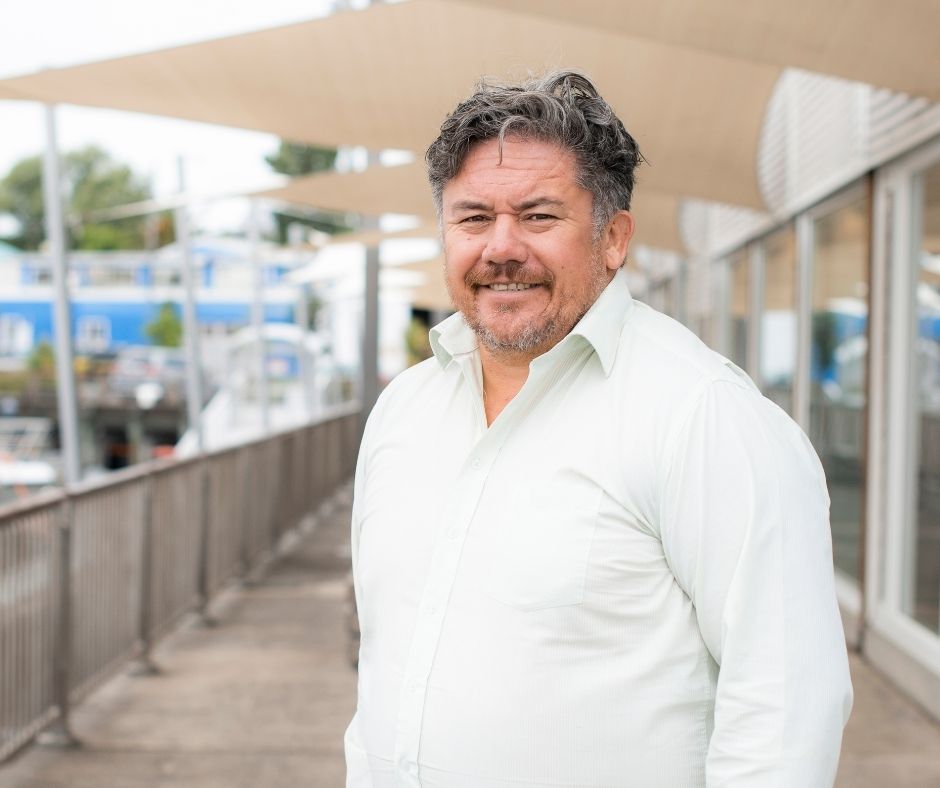 Turanga Health chief executive Reweti Ropiha has been announced as one of 100 inspirational Kiwis who have made a difference in their corner of Aotearoa. The group of 100 local heroes from Cape Reinga to Bluff have fed families in need, donated thousands of volunteer hours, or carried out exceptional work for the benefit of those around them. The medallists are now in the running for the coveted 2023 Kiwibank New Zealand Local Hero Award Te Pou Toko o te Tau. Mr Ropiha is chief executive of Turanga Health and says the surprise nomination goes a long way to honouring the work of staff at the iwi health provider. “This is an accolade for the hundreds of staff that have worked at Turanga Health since its inception in 1997, staff who work here now, and whānau and families who have put their faith in us over the years.” A champion for his people and their health, Mr Ropiha, Rongowhakaata, Ngāi Tāmanuhiri, has been at the helm of Turanga Health for 25 years. He and his team worked hard during the pandemic to help the region get vaccinated. With a kaupapa Māori approach that included hosting mass vaccination events around the rohe and face-to-face kōrero, he was driven to provide opportunities for people to engage with the science about vaccines in ways that suited them. Mr Ropiha was wrapping up a weekly Turanga Health board chair Pene Brown presented him with the Kiwibank Local Hero medal. “It was a surprise,” says Mr Ropiha. “I thought Pene was here to acknowledge staff birthdays!” Mr Brown doesn’t know who nominated Mr Ropiha. He says the natural-born leader shies away from limelight, so it was important to him that the medal was presented in front of the full team. “As well as his behind-the-scenes strong leadership, like all Turanga Health staff, Reweti worked hundreds of hours at community vaccination events,” says Pene. “He was there alongside everyone else through those busy hectic days of the pandemic, in hi-vis at the head of the car queue.” Mr Brown says Mr Ropiha and Turanga Health has continued to lead the way in the region’s Covid-19 response, spearheading innovations such as community events that offer a range of vaccinations, emergency housing pods at local marae, and a health hub in Elgin. Sharing his skills and knowledge across many organisations, Mr Ropiha is also involved with the Vanessa Lowndes Centre, Matai Trust, Nga Taonga a Nga Tama Toa Trust, and the Sunrise Foundation. The 2023 Kiwibank New Zealand Local Hero Award Te Pou Toko o te Tau forms part of the Kiwibank New Zealander of the Year Awards. The list of 100 Local Heroes will be whittled down to 10 finalists in mid-December. The three other Tairāwhiti heroes nominated alongside Mr Ropiha are #Hear4U founder Krissy Mackintosh, Tokomaru Bay Civil Defence coordinator Lillian Te Hau Ward and Te Tairāwhiti arts festival director Tama Waipara. Meanwhile, Mr Ropiha was recognised at the Gisborne District Council Civic Awards this month. The local awards acknowledge individuals or organisations involved in substantial community service that benefits the people of Tairāwhiti. Mr Ropiha was recognised alongside Alexia English, Amanda Mathers, Rawinia Parata and Jason King. |
Media Releases
Email us if you want to receive our media releases. Archives
February 2024
|

